- While Americans are split on Biden’s handling of the pandemic, Biden and Democrats are more trusted than Republicans on pandemic-related issues.
- There is growing optimism on the state of the pandemic, matching pre-Omicron sentiments from November 2021.
- Americans aren’t yet embracing a return to normal, but they are ready to “get back on track” and take steps to learn how to live with coronavirus using tools like masks and vaccines while remaining vigilant.
- Mask mandates remain popular, but with nuance: a plurality support them overall and when case counts are high, while also supporting lifting mask mandates when case counts are low.
Biden’s Approval Ratings Overall and on Handling the Economy Are Underwater, But Split on Handling the Pandemic
Biden’s approval ratings are consistent with early February numbers: overall, he is at -12 now and was at -12 then, is at -16 on the economy now and was at -17 then, and is at -1 on the pandemic compared to breaking even in early February.
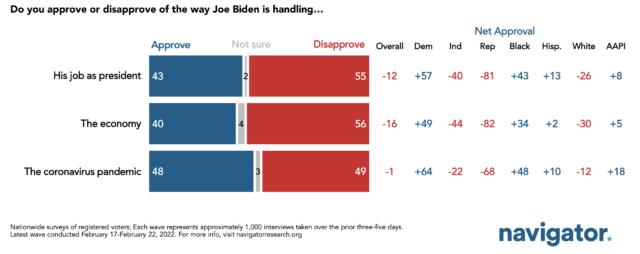
Country Sees Biden as Still Focused on Pandemic, Though Fewer Americans See It as a Priority in the Current Moment
While the share who want to see Biden and Congress focused on the pandemic has dropped 9 points since January 24 (from 49% to 40%), desired prioritization of inflation has increased 9 points (from 37% to 46%).
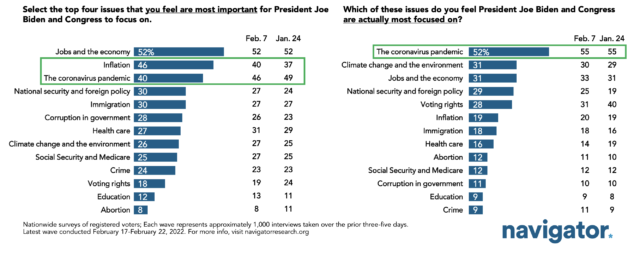
Jobs and the Economy Has Risen as a Top Priority While Focus on Pandemic Has Diminished
While 26% of Democrats say the pandemic is their top issue, just 17% of independents and 9% of Republicans now say the same. On the economy, 23% of Republicans, 19% of independents, and 15% of Democrats say it is their top priority.
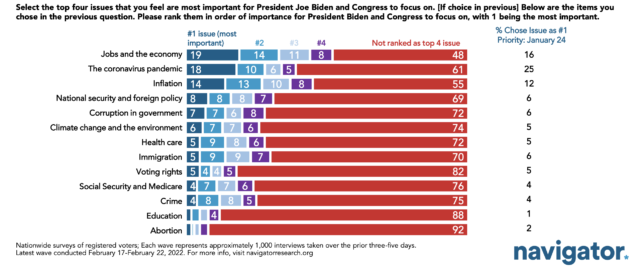
Biden and Democrats Remain Far More Trusted on Pandemic Related Issues Than Republicans
Among independents, Biden and Democrats hold a 26-point trust advantage on “ensuring enough people are vaccinated,” a 7-point advantage on “combating the coronavirus pandemic,” and a 7-point lead on adjusting policies to adapt to the changing pandemic.
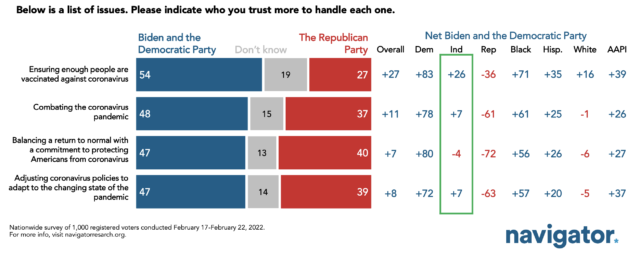
Optimism About the Pandemic Is at Its Highest Point Since the Emergence of the Omicron Variant in November
Majorities of Democrats (52%) and Republicans (55%) say the “worst is over” in the pandemic, as do a plurality of independents (42%).
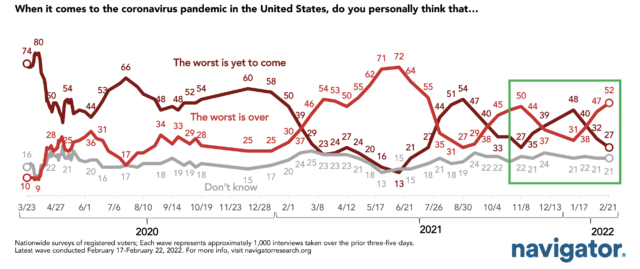
While Most Americans See Continuing Personal Impacts of the Pandemic, Even More See Disruption to the Country Overall
While two in five said the pandemic was over for themselves in November 2021, roughly the same share say it is over for them now. Similarly, just one in four say the pandemic is over for the country now, as did 20% in early November.
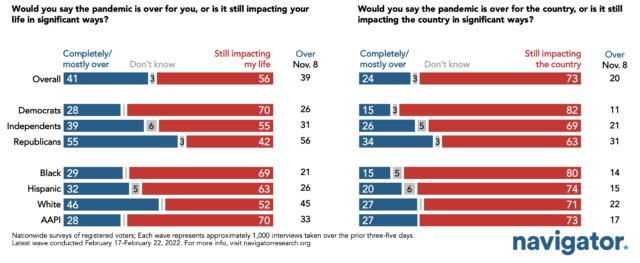
There Has Been a 10-Point Decline in the Share Who Say the Pandemic Is a “Major Crisis” Since Early February
The greatest declines in the shares who say the pandemic is a “major crisis” have happened among Democrats (13-point decline, from 55% to 42%), Black Americans (11 points, from 55% to 44%), and Hispanic Americans (10 points, from 47% to 37%).
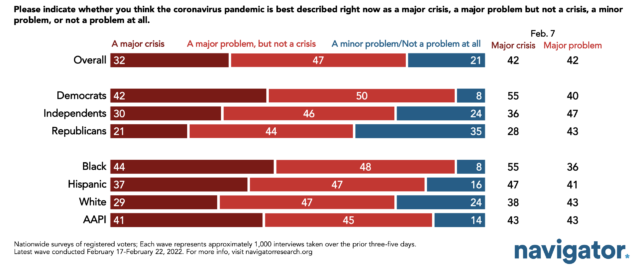
Americans Show More Acceptance of Enduring Nature of Coronavirus in 2022 Than Did in 2021 or 2020
Overall, there has been a 35-point increase (from 34% to 69%) in the share who say the pandemic will not be over until the end of the current year or never compared to April 2020 and a 12-point increase from March of 2021 (from 57% to 69%).
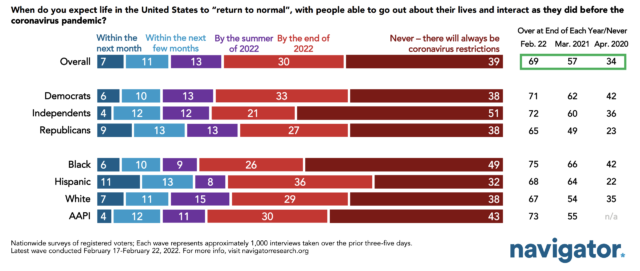
“Learning to Live With Coronavirus” Means Treating It Like the Flu, Using Tools Like Vaccines, and Adjusting to It as It Comes
Democrats focus more on long-term usage of vaccines, masks, and other public safety measures as a part of “learning to live with coronavirus,” while Republicans make the comparison of the virus to the flu as endemic, including it not going anywhere.
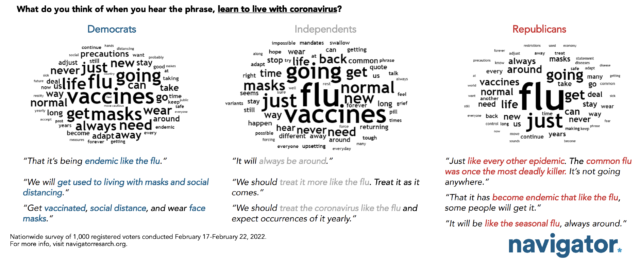
Americans Do Not See a “Return to Normal” Now, But Are Split Between Living With Pandemic Tools and Staying Vigilant
Only a minority (28% when given two choices, 15% when given three) believe “we should return to normal because the pandemic is over.” However, when given the option, a plurality say, “We should live our lives using the tools we’ve developed.”
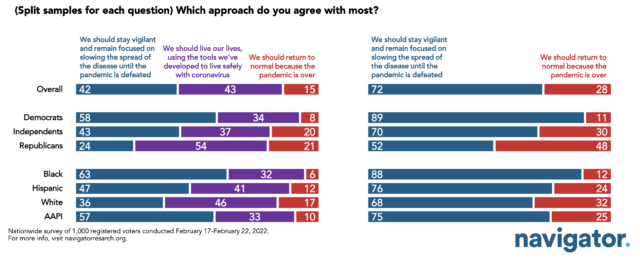
“Getting Back on Track” and Coronavirus as a “Part of Life” Are Best Frames for Next Few Months
Majorities prefer “getting back on track” over “returning to normal” or “living a new normal.” When choosing between coronavirus as “a part of life” or “post-pandemic life,” 54% choose the former.
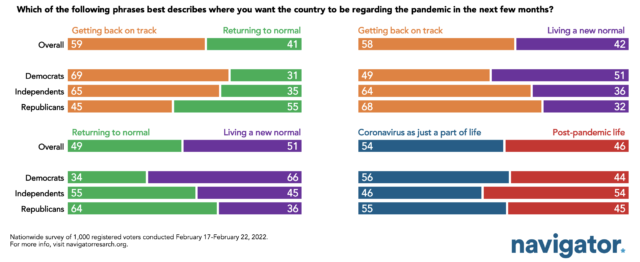
Americans Agree Most with Statements About Using Public Health Tools and Staying Vigilant on Coronavirus
Among those who disapprove of Biden’s handling of the pandemic but trust Biden and Democrats more than Republicans to combat the pandemic, 73% agree with messaging focusing on living safely with coronavirus using tools like vaccines and tests.
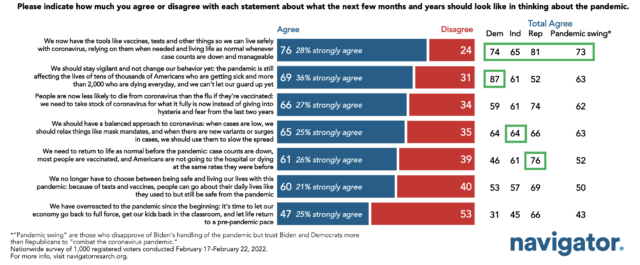
Majorities See Vaccines as More Important Tool to Deal with Pandemic Than Masks
Three in five say vaccines are more important than masks to deal with the pandemic, including 56% of those who disapprove of Biden’s handling of the pandemic but trust Democrats more than Republicans on the pandemic.
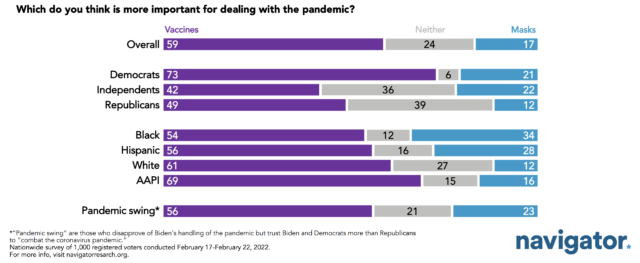
Six in Ten Americans Continue to Approve of the Coronavirus Vaccine Rollout
Three in five continue to support the vaccine rollout overall, including 80% of Democrats, 43% of independents, and 45% of Republicans.
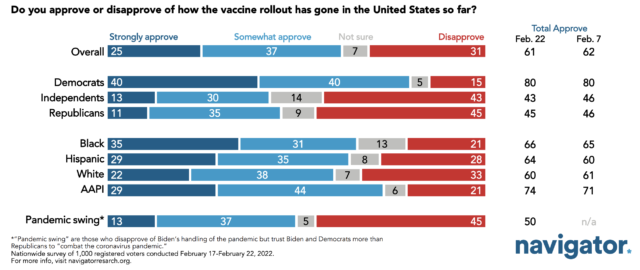
Two in Three Continue to Support Mask Mandates Broadly
Bipartisan majorities support mask mandates, including 91% of Democrats, 55% of independents, and 41% of Republicans.
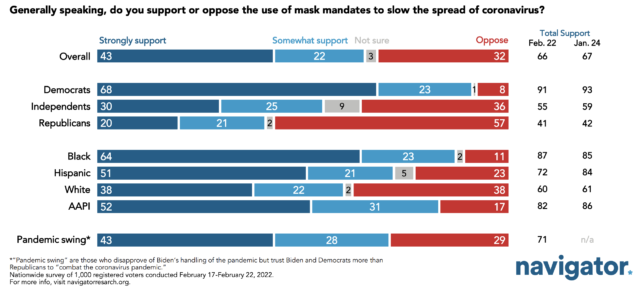
But There Is Nuance: Greater Majorities Support Keeping Mask Mandates When Cases Are High and Lifting When Low
Bipartisan majorities support having mask mandates when case counts are high and lifting them when case counts are low.
- Among those who disapprove of Biden’s pandemic handling but trust Biden and Democrats more than Republicans to combat the pandemic, 77% support mask mandates with high case counts and 59% support lifting mask mandates when they are low.
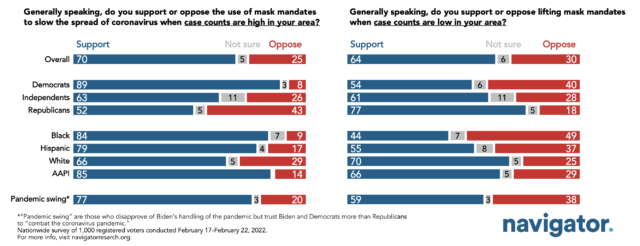
A Plurality Support Mask Mandates Broadly and When Case Numbers Are High, But Support Lifting Them When Low
Of those who support mask mandates overall and when cases are high, but support lifting mask mandates when case counts are low, 59% are Democrats, 8% are independents, and 33% are Republicans. They give Biden high marks overall and on the pandemic, feel the worst of the pandemic is over, and four in five are fully vaccinated with another 4% who are partially vaccinated.
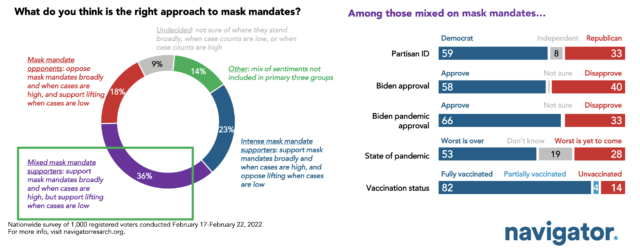
About The Study
This release features findings from national online surveys of 1,395 registered voters conducted February 17-22, 2022. Additional interviews were conducted among 100 Hispanic voters, 100 African American voters, 100 independents without a partisan lean, and 75 Asian American and Pacific Islander voters.

